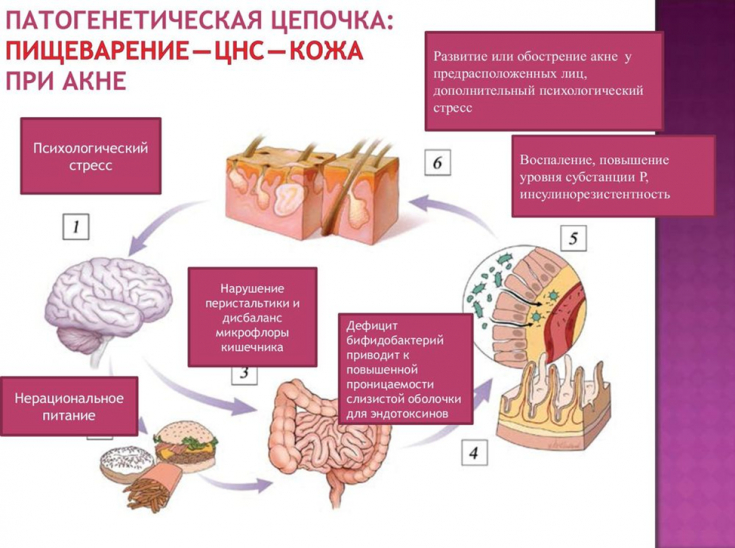More and more scientific evidence confirms that the condition of our skin is directly related to the condition of the small intestine.
Studies show that patients with rosacea, atopic dermatitis, and acne have bacterial overgrowth in the small intestine several times more often than people without these conditions.
According to a 2017 study, patients with inflammatory bowel disease often experience inflammatory skin conditions such as acne, rosacea, atopic dermatitis or psoriasis.
Read on estet-portal.com how the intestines and skin are connected, and how much violation of the diet is instantly reflected on our face.
- Intestine and skin: two unique barriers of our body
- What factors affect the condition of the intestines and skin
- How the condition of the small intestine affects the skin
Intestines and skin: two unique barriers of our body
The main function of our skin – act as a barrier against the dangers of the outside world. At the same time, the intestines, like the skin, protects our body, but from the inside, providing physical, chemical and antimicrobial protection.
Stress and inflammation in the gut can break down this protective barrier, which in turn can lead to decreased production of antimicrobial substances in the skin, leaving it vulnerable to infection and inflammation.
In a healthy digestive system, fats, proteins, and carbohydrates are broken down into fatty acids, amino acids, and sugars, which pass through the intestinal lining, are then absorbed into the bloodstream and distributed where they are needed.
Read also: Appetite under control: how to reduce ghrelin synthesis
If proteins are not completely digested, they pass from the intestines into the bloodstream, the immune cells identify them as "foreign", and an immune response occurs. This can suddenly cause intolerance to foods that you are not allergic to.
Read the latest articles in Telegram!
Intestinal problems cause both systemic and local inflammation, which can then manifest as problems skin.
What factors affect the condition of the intestines and skin
Factors that destroy the lining of the intestines and worsen the skin include:
- antibiotics;
- stress;
- certain medications (proton pump inhibitors, non-steroidal anti-inflammatory drugs);
- alcohol.
In particular, antibiotics can seriously disrupt the unstable microbial balance in the colon. Long-term use of oral, low-dose antibiotics for acne may work in the short term, but they may harm gut health in the long term.
How the condition of the small intestine affects the skin
Many patients make a connection between food and skin:
- For example, many people associate rosacea outbreaks with spicy foods or hot drinks;
- Food allergies play a special role in eczema;
- And psoriasis has an increased correlation with gluten intolerance.
Read also: Barrier function of the skin in atopic dermatitis

Chewing stimulates the stomach and intestines to secrete acid, bile and enzymes. If we eat very fast, we won't have enough time for all these messages to arrive on time, resulting in a lack of stomach acid, bile, and enzymes. This means that the food is unlikely to be digested sufficiently before it enters the small intestine.
In a healthy digestive system, nutrients are absorbed in the small intestine. But the undigested, larger particles will pass into the large intestine, where most of the gut microbiome resides.
Microbiome gladly consumes poorly digested fats, proteins and carbohydrates, which leads to putrefaction and fermentation. This not only promotes gas formation, but also feeds the opportunistic flora, causing it to overgrow, known as dysbiosis.
The microbiome is extremely vulnerable and easily destroyed. Lack of fiber or a poor diet in general, microbial infections, food poisoning, alcohol, stress, and taking several different types of medication can lead to longer-term problems that often manifest in the skin.
More useful and interesting information on our channel on YouTube:






Add a comment